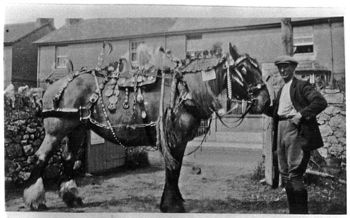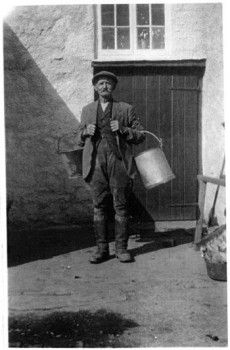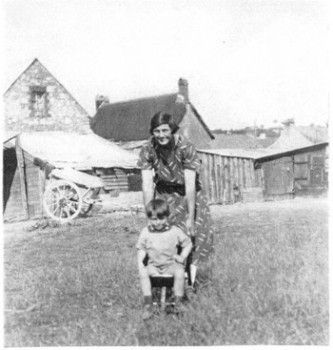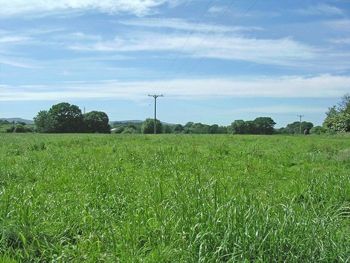David Baker Memories
David was born in Kingsteignton and has chosen to share with us some of the memories he has of life as a child here. The village was much more countrified than it is today yet some of the pursuits of young lads in those days were not dissimilar to those of today.
I was born in Chudleigh Road at number 36 and the owner of our houses, a terrace, used to live in Number 32, called Joe Cleave and he had an old vintage car in his garage which was attached to the end of the block of houses and he used to take the back wheel off and attach to it a grinding mechanism and he used to grind his own corn into flour for making his own bread. Dirty old man he was but quite a character and lived like a hermit. Just a little bit further down the road, living at Number 28, was Charlie Williams, the undertaker and he used to have a workshop (it’s still there) and used to have a little room underneath where he used to keep the bodies and he used to build the coffins over the top in his workshop. He used to drive around in a great big Buick car with a canvas top and that used to be his undertaker’s car and he used to put coffins in the back and goodness knows what and he was another big feller, about 6ft 3, always wore boots and leggings and very loud and shouts at people but, again, one of the characters of the village.
Down the corner shop, at the end of Chudleigh Road, adjacent to Exeter Road, on the left hand side going down was a little sweet shop and a lady called Mrs Staddon (we used to call her Jessie). She used to run this little shop and we, as kids, used to go in there with our pennies and halfpennies and we’d get half a pence worth or half a penny of the old penny in broken bits which she used to get out of the bottoms of all the jars so you used to have quite a bit of a mixture.

Just towards the end of the War, maybe a little bit before that, we moved down to Number 22 and opposite us was Bill Coles who used to run a farm, believe it or not, over where all the council houses are now, and as kids we used to go in and stand by the shippons and watch him milking and he was very good, ‘cos, as he was milking, he’d turn the teat on the cow and squirt milk all over you from quite a distance and in a tin shed in the yard of the farm was all the milk that had been boiled and scalded as we called it for cream and you’d run across the road with your jar or whatever you wanted, a dish and old Mrs Coles used to come out and scrape all the cream off the top of the big metal containers and dish out you cream for what you wanted to take home. Happy days but what about the hygiene?


Now we come to our notorious Tom Whitear and Tom used to deliver milk in the early hours of the morning on a little 2 wheeled hand cart. He was working, I think, for Newton Abbot Dairies which had just started and he only had one hand which was, I think, blown off during the ‘14-18 War but he would start delivering the milk maybe 5 o’clock mornings and he had a great big bell hanging under the handle of this cart and it would be nothing for him to be ringing this bell at 5 or half past 5 in the morning and he would shout out, ‘If I’m out, everybody’s out!’ Quite a character and he also was the man who you see in many of the old pictures at the Ram Fair and Tom was always behind the back of the ram, dipping the fat over it from underneath and issuing you out with a lump of bread as a kid and you’d go across and dip it in the fat which was rather nice.


When we were quite young, in fact even when we got older, the only place where we used to go picnicking and swimming (was) over the River Teign, by the bridge, and that’s where most of the Kingsteignton lads learnt to swim. There were 2 sections, one just over the bridge which was for beginners and there was ‘big boys in’ they used to call it down the far end of the field on the left hand side where there was a deep pool and when you got older and you could prove yourself you were allowed down there to mix with the big boys. Silly things used to happen like trying to ride your bike across the river and also picking up a big stone and trying to carry that across and seeing how far you could get before the tide swept you away. Also, during the War, I’ve seen the Americans who were based at the Newton Abbot Racecourse land light aircraft, little Pipers, in that field and go in the water and have a swim. One unfortunate American decided to dive off the bridge and hit the bottom which didn’t do him any favours.

At the end of Broadway Road, on the corner, there used to be a little copse or woods and in there used to be a tramp and we used to call him ‘Smokey Bill’, ‘Smokey Joe’, I’m sorry and many a night we’ve left the river and gone in and sat with him around his camp fire and he was as black as your hand from the fire smoke, never washed and, on occasions, he used to be joined by a lady tramp who was called Ethel and she used to stay with him there some nights and another night you would see her walking up the road to Chudleigh with another chap who was called ‘Sailor Bill’ but he lived up in Chudleigh Woods but they were people to be interested in listening to of all their topic of conversations they used to come out with.
If you walk up Broadway towards the village, on the corner on the left hand side adjoining the main road coming down through, was a paint shop where they used to sell paints etc and that was owned by a chap called Bill Bartlett and Bill Bartlett was a ……… and used to sit all the time he had in the doorway of his shop watching everybody go by……. For hours on end he used to sit there and this chap right opposite was called Gorwin Partridge and the 2 of them used to get together by the side of Bill Bartlett’s shop and natter about everything and watch all the people walking by. Mr Bartlett, Bill Bartlett’s son, he was also called Bill, used to be a painter and decorator around the village. If you come away from there, on the corner down towards Teignmouth or Newton Abbot, on the left hand side just past the filling station, there’s the King’s Arms pub and this is where all the clay cutters and the gypsies used to congregate on many nights. When I was extremely young, I remember distinctly seeing 2 gypsies fighting, bare knuckles, in the car park behind the back of the King’s Arms with a ring of people around them to make sure that they didn’t disappear completely. Of course the guys from the clay pits, my grandfather and people like that would be tanked up with their scrumpy or cider and in their bags that they used to carry with them, they’d fill up 2 quarts of cider to take to work the next day which they used to consume and then get ready for the next evening to bring the bottles and fill them up again and that’s the way that they worked down at the clay mines and they worked extremely hard, up to their ankles in mud most of the time and …ventilation at all and all wet and everything dug by hand no mechanical assistance in those days but they worked hard and they played hard.
The owner of the King’s Arms back in those days was a chap called Prost and he was an ex-army sergeant-major with a bristling moustache and he always seemed to be with his sleeves rolled up and stood in the doorway of his pub, looking at everybody and woe betide if you stepped out of line because, Prosty, as we called him, would most certainly sort it out. Across the road from there, in the centre where the roads all branch off was the two great big drinking troughs for the horses. As they were taking clay to various places because everything in the early days, was transported by horse and cart and they were 2 wheel carts and the driver of course and they would stop there and replenish the horses water if they needed it. Then there was Mrs Sanders’ fish and chip shop where we all used to congregate as teenagers, at night, and sit on the wall and skylark about eating our fish and chips and chasing all the girls that we came in contact with. And Mrs Sanders’ chip shop, in the later years when I played Rugby, many a night when I came home at midnight after a Rugby match with Dave Bennett and all those crowd and Mrs Sanders would be still open and we’d go in and sit down and have a mixed grill. At 12 o’clock at night, what a mixed grill she used to produce!

Across the road from the Infant School, Church School, on the corner, leading into Orchard Close (I think the name of the road is called) round the back was a newsagents and that was owned originally by Bill Picket and his daughter Margaret was there. She married a chap called Henry Nicks and he took over looking after that shop and Bill and his wife moved up to a little tiny shop in Exeter Road, right opposite the garage at the top end of the village. But he was another character who lived on his push bike and never seemed to wash and we always used to shout at him and say ‘Bill Picket couldn’t thick it’ and he used to get quite annoyed and shout at us and chase us but of course he was unable to catch us.
As we got older after work we used to go to the football pitch in Rydon Lane right next to the British Legion hut and all meet there and play football, kicking around together and skylarking about, doing all sorts of things that 15/16 year olds would be up to and many a night we had a tremendous laugh watching various people vacating the British Legion after nights of drinking. One particular person I can remember distinctly, watching him come out of the British Legion hut at the far end and literally walking along the wall, holding onto the side of the hut to get to his bike which was down the far end and put his leg over the bar and sat on the seat and there used to be a slope from the car park down to the road and he came haring down the slope and across the road was Tuplins where there used to be a nursery and he couldn’t stop and he crashed right into Tuplins’ gate and fell onto the floor in a great big heap at which we all doubled up laughing and tried to help him up. He eventually disappeared up the road with his bike at an angle of about 30º leaned on and walking beside it and his comments were ‘the only reason he brings his bike was to be able get home’ laughing all the way and shouting abuse at everybody.
In the school I was at ….. the headmistress used to be a Mrs Lyons and sister, the second in command, was called Miss Evans. They were wonderful people and dedicated to their job, made you feel most secure and safe and did spend a lot of time looking after you and talking to you if you had problems, something that I think lacks these days. When you were about 7 or 8, maybe a little later, you moved down to the school down by the church. The headmaster down there was a chap called Bill Peart who used to live up Chockland Avenue, opposite …… He was a bit of a character. He used to ride a bike every day, to and fro and sit on the desk in the front of the class and if you could persuade him to start talking about the 1914-18 War, you never done anything else for the whole of the lesson. He’d tell you all about all his experiences that he went through in the trenches during the War years in France. Not much good for your education but we all got to know about the War years.
When you became, I think it was 12 or 13, you moved up to the school at the end of Chudleigh Road where the headmaster was called Hosgood and he was a different character altogether and he was ready with the cane any time if you stepped out of line, including if he saw you out in the road at night doing something that you shouldn’t be doing then and he would sort you out the following day at school but none of it did us any harm despite the chastisement we had from time to time.
We used to have a chap called Hoskins who, if you were home from school, would come round knocking on your door and that’s the reason why, he was the School Inspector. I don’t know if they have one these days but they’d catch a lot of people out, wouldn’t they.
Half way down Gestridge Road was the house called Sunnyside where Arthur Miller, our doctor, used to be. Quite a character he was. I can remember falling off my bike and breaking my collar bone and being taken to Arthur and he just shoved a pad under my arm and some Elastoplast around my body and says, ‘there you are boy, come back and see me in 2 weeks’ time’. That’s the sort of treatment you used to get from Arthur. A well respected man and he knew everybody, a super guy.
At the end of your road where the surgery is was Honeywill’s the butchers, run by a chap called Fred Gurr. I can remember now seeing all the meat in the window…..I’d just imagine they’d go mad today seeing all that. And I used to buy a favourite joint for my mother. She used to send me down and it was called a ‘tag end’ which has quite a big bone in it but lovely flavoured beef if I remember rightly. That was the Sunday roast and obviously last through for a couple of days afterwards, cold beef on Monday and probably minced up for some more for some other meal.
If you leave the Fountain shop and towards Newton, on the left hand side where all the mobile homes, I call ‘em now, the chalet places are, that used to be the gypsy camp where all the ….. Harrises used to live in their caravans and tents and goodness knows what. There used to be some fun and games in there on occasions when the Police used to have to go in there and separate them all up from their fights. The other thing I thought about was the little leat or stream that runs through the village across Crossley Moor. No doubt you’ve heard the story about the village was in a drought situation and they sacrificed a ram and prayed for water and a spring came up at the end of Rydon Lane and that’s the one that runs right across Crossley Moor. That’s the story. Of course it then was then diverted in such a way, there was a mill, Miller Daw used to use the stream to grind his water wheel to grind all the corn and stuff and that used to run right past the Bell Inn and right on down through Berry Lane and disappeared on down into the river. And around Fair time the leat used to be cut off so that the council could clean it all out and we as kids used to go over with our nets etc and try and catch all the little stickleback fish ….that used to be in the little pools that were still left in the bottom of the stream.
Further down on the other side of the churchyard the stream continues down, as I said, there was Miller Daw and there was another water wheel down there that the leat used to drive and David Daw I see frequently down at the Bowling Club whose father used to run the mill down there. I can remember that working as a lad as well.
‘Course when I was about 7, 6 I suppose, 1933 I was born, 1939, the War started and things changed dramatically. At the time we were all issued with gas marks and we used to go to school with our little brown cardboard box attached with a piece of string over our shoulder and when the sirens went to warn you of a possible air raid you all were allocated a friend from school and you would go home to their house in the close proximity of the school but not all in one group. Alternatively if you couldn’t find somewhere to go you would have to go out into the playground and sit up against the wall until the all clear system went. We never had any actual bombs drop in Kingsteignton but there have been occasions when we’ve seen the German aircraft flying over and I can well remember when they bombed Newton Abbot Station and I was in the town with my mother and quite a number of people were killed.
These are just a few little items that I’ve suddenly remembered which may be of interest to you. In Broadway Road, just up from the corner where Smokey Joe used to be was the great big engine house that used to drive all the mechanism for the clay pits in beyond there and that was a great big fire operated steam boiler and they used to light the wood fire and build up the steam and they used to all the buggies up the slope from the bottom of the clay pit up to the top ….. by pulling a lever that would operate the cable mechanism and at night when it was quiet you would hear this thing which used to run all through the night with this pneumatic noises with this fly wheel .. as kids we used to stand around and admire and watch this happening.

The other thing I was thinking about was when the Americans were here during the War they used to drive these great big lorries and tanks on the main streets of Kingsteignton, if you can call them main streets, and they’d always throw things out to you as kids we’d get on the pavement packets of chewing gum, sweets, and even tins of spam used to come out on occasions which was most helpful as things were quite short in those days.
The other old chap who used to run a business was living in Number 20 Chudleigh Road, in fact lived next door to us when we moved to Number 22 and he used to run a paraffin round and he was called Les Burridge. His son, John Burridge, he used to run the Oakford filling station after his father died. He used to have a big Dodge van and at the back of this van was a large tank which he used to fill up from a big tank he used to have underneath the garage floor, pump it up and he used to go out and deliver paraffin and the tap which was connected to the tank and as kids we used to go out with him sometimes and we’d have to sit on top of the paraffin tank because there were no other seats in the van to ride on. He was a notorious chap for working late at night and he’d think nothing of being up on the moors, Bickington and places like that at 8, 9 o’clock at night in the winter. He kept everybody going with paraffin which was the main source of heating and lighting in a lot of cases back in those days.
